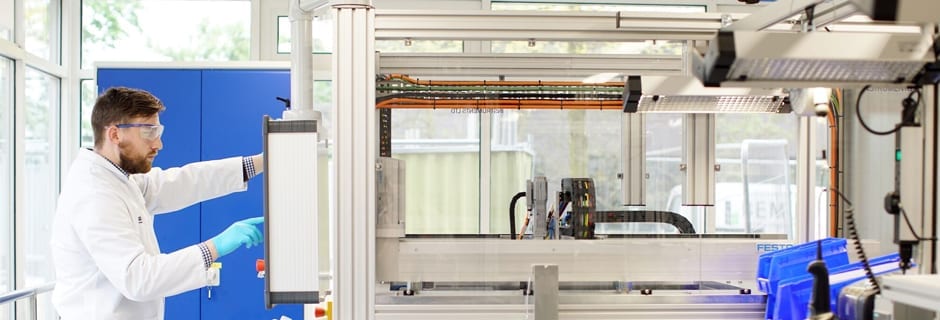With 10 ten years’ experience working on automotive electrification challenges, WMG has completed a project to automate the assembly of battery modules and packs for small to medium volume electric vehicles.
[title size=”4″]WMG is developing new and improved solutions to balance the evolving, challenging and complex energy supply and demand environment across applications including automotive, manufacturing and the grid.[/title]
As the automotive market changes and grows, transport authorities and industry must manage and improve new infrastructure and technology. WMG, at the University of Warwick, is collaborating with industry partners on market-focused projects to enable the automotive sector to meet Government legislation and growing demands of consumers. WMG transfers knowledge to support the development and improvement of products, processes and services.
[title size=”2″]The future is bright for EVs[/title]
Non-ICE (internal combustion engine) vehicles currently account for just 3% of the UK automotive market. Historically, UK manufacturers have avoided this comparatively small segment as the low production volumes have not justified heavy investment in hybrid and electric vehicle R&D. However, with the global legislative push for low carbon vehicles, there is a growing need to increase the knowledge and capability for design and production of modular battery systems that can be applied across multiple manufacturers.
[content_boxes layout=”icon-with-title” iconcolor=”” circlecolor=”” circlebordercolor=”” backgroundcolor=””]
[content_box title=”Hot Topics” icon=”” image=”” image_width=”35″ image_height=”35″ link=”” linktarget=”_self” linktext=”” animation_type=”0″ animation_direction=”down” animation_speed=”0.1″]
- WMG’s AMPLiFII project automated assembly of battery modules and packs for small to medium volume electric vehicles
- The project also investigated solutions for recycling and re-use of battery packs
- Partners included University of Oxford; JaguarLandRover; JCB and Alexander Dennis (ADL)
[/content_box] [/content_boxes]
This was further reinforced by the UK Government’s announcement, in July 2017, that all new vehicles will be electric or ultra-low emission by 2040.
With 10 ten years’ experience working on automotive electrification challenges, WMG has completed a project to automate the assembly of battery modules and packs for small to medium volume electric vehicles.
[title size=”2″]The AMPLiFII project[/title]
The Automated Module-to-Pack Pilot Line for Industrial Innovation (AMPLiFII) project was funded by the Office for Low Emission Vehicles (OLEV) in partnership with Innovate UK. It combines the research excellence of WMG and the University of Oxford with JaguarLandRover, JCB, Alexander Dennis (ADL) and Ariel Motor Company, as well as technology specialists Delta Motorsport, Potenza Technology, Trackwise and Horiba MIRA, and sustainability partners Axion and Augean.
The project team designed and developed a modular battery architecture for diverse high power and high energy applications such as motorsport, heavy industrial plant, fully electric and hybrid cars, and hybrid buses.
[testimonials backgroundcolor=”” textcolor=””]
“In July 2017 the UK Government announced that all new vehicles will be electric or ultra-low emission by 2040”
[/testimonials]
This flexibility enables supply chain partners to combine the demand of multiple markets to create economies of scale. All applications use a common cylindrical cell format. The modular design and production line developed in the project could easily be adapted to other cell formats, such as pouches.
The project also looked at solutions for recycling and re-use of battery packs, by defining secondlife and end-of-life process pathways to avoid the current practice of burning Lithium-ion cells.
[testimonials backgroundcolor=”” textcolor=””]
“WMG’s Energy Innovation Centre supports development and scale-up of new battery chemistries… in sufficient quantities for detailed industrial evaluation in target applications”
[/testimonials]
[title size=”2″]Real-world impact[/title]
AMPLiFII was developed to test and demonstrate manufacturing processes at automotive production rates and quality, including in-line quality verification, a no-faults-forward policy and a fully flexible, integrated approach.
Methods for reclamation of materials from cylindrical cells were developed and proved, and second-life opportunities for both modules and packs were defined. As a result of confidence gained from this project, further Government funding and industrial research projects have been approved.
At the core of this research was WMG’s Energy Innovation Centre (EIC), whose dedicated facilities and expertise support development and scale-up of new battery chemistries, from concept through to fully proven traction batteries, produced in sufficient quantities for detailed industrial evaluation in target applications. UK MR

